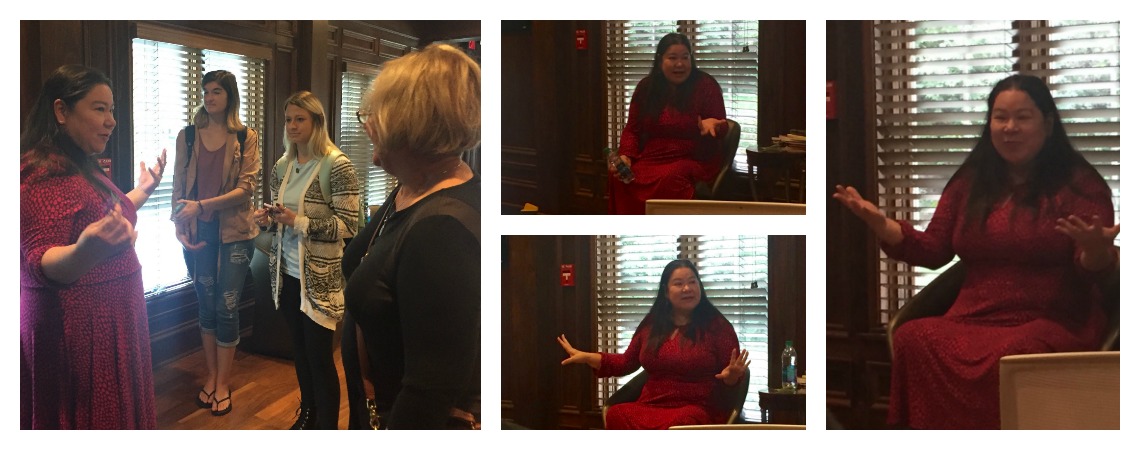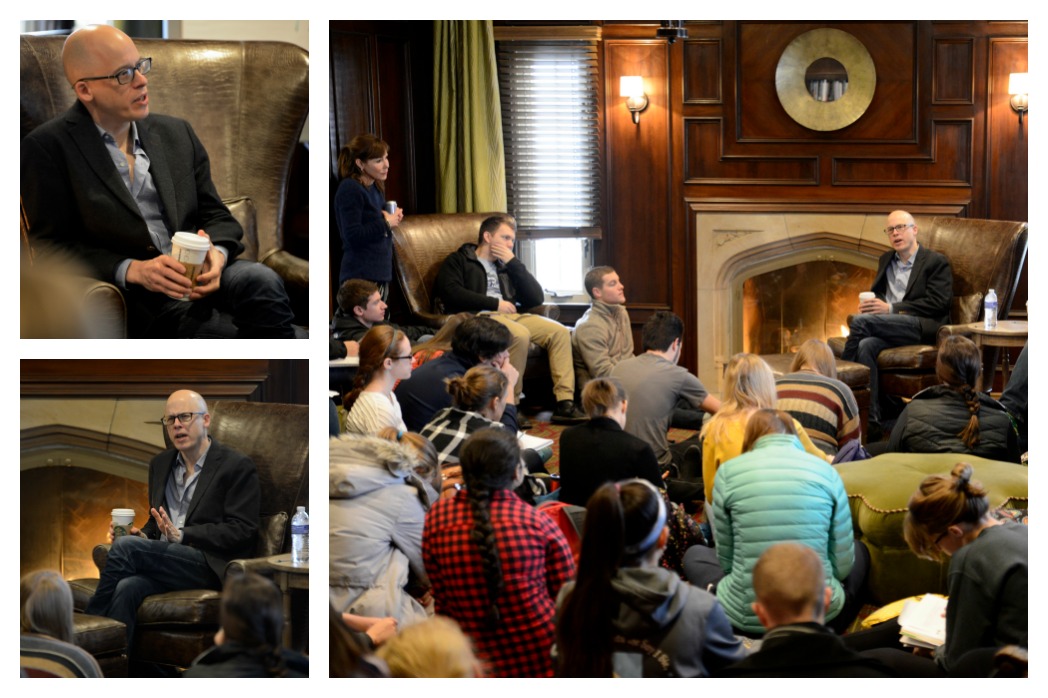 On his recent visit to Butler University as a Vivian S. Delbrook visiting writer, Benjamin Percy discussed genre writing, read from his new thriller (Dead Lands, a post-apocalyptic reimagining of the Lewis and Clark saga), held a student Q & A, and met with MFA fiction candidates for one-on-one workshops.
On his recent visit to Butler University as a Vivian S. Delbrook visiting writer, Benjamin Percy discussed genre writing, read from his new thriller (Dead Lands, a post-apocalyptic reimagining of the Lewis and Clark saga), held a student Q & A, and met with MFA fiction candidates for one-on-one workshops.
Percy was introduced to an audience of Butler students and community fans by MFA student John Eckerd. “He’s a modern Edgar Allen Poe without the weird hair; A Raymond Carver with scarier dreams.” With a voice like Samuel Jackson, (developed, Percy says, on a diet of beer) Percy discussed the differences between literary fiction and genre fiction. He grew up on genre fiction, but fell in love with literature as a college student. In literary fiction, Percy says, “You create three-dimensional characters you think about years later. You create great lines you can hang on your wall.” In genre fiction, Percy says, “All six cylinders are blazing. You never lose track of what’s most important – what happens next.”
Percy asked himself to write the kind of story he’d fall in love with as a child. “My childhood can only be described as preapocalyptic,” Percy said. “Falling off the grid has always been an active part of my fantasy life.”
While his story ideas are wildly imaginative, his writing process is as analytical as an accountant’s spreadsheet. He reads a novel he admires at least six times before becoming emotionally detached enough to dissect each chapter into a structure. He works in an old dark room he calls his “nightmare factory.” For at least a year, Percy plots out stories on paper he’s ripped from his children’s art easel. His story map is “like a constellation or a seismograph.” There are bright points and lots of up ticks and down ticks.
 Because he is so precise in his own writing process and so willing to share advice, fiction MFA students were eager to meet with him one on one to discuss their work. Percy spent time with students’ work beforehand, covering the pages with notes and considerations. When he met with them one on one, he offered specific advice on the submission, general writing techniques, and writing career tips. Thesis candidate Dave Marsh said, “Percy was excellent 1:1. I am SO glad I made the effort to sign up for one of those workshop slots. I can’t wait to get hold of his craft book [Thrill Me: Essays on Fiction, October, 2016] that will come out later this year.”
Because he is so precise in his own writing process and so willing to share advice, fiction MFA students were eager to meet with him one on one to discuss their work. Percy spent time with students’ work beforehand, covering the pages with notes and considerations. When he met with them one on one, he offered specific advice on the submission, general writing techniques, and writing career tips. Thesis candidate Dave Marsh said, “Percy was excellent 1:1. I am SO glad I made the effort to sign up for one of those workshop slots. I can’t wait to get hold of his craft book [Thrill Me: Essays on Fiction, October, 2016] that will come out later this year.”

 On his recent visit to Butler University as a Vivian S. Delbrook visiting writer, Benjamin Percy discussed genre writing, read from his new thriller (Dead Lands, a post-apocalyptic reimagining of the Lewis and Clark saga), held a student Q & A, and met with MFA fiction candidates for one-on-one workshops.
On his recent visit to Butler University as a Vivian S. Delbrook visiting writer, Benjamin Percy discussed genre writing, read from his new thriller (Dead Lands, a post-apocalyptic reimagining of the Lewis and Clark saga), held a student Q & A, and met with MFA fiction candidates for one-on-one workshops. Because he is so precise in his own writing process and so willing to share advice, fiction MFA students were eager to meet with him one on one to discuss their work. Percy spent time with students’ work beforehand, covering the pages with notes and considerations. When he met with them one on one, he offered specific advice on the submission, general writing techniques, and writing career tips. Thesis candidate Dave Marsh said, “Percy was excellent 1:1. I am SO glad I made the effort to sign up for one of those workshop slots. I can’t wait to get hold of his craft book [Thrill Me: Essays on Fiction, October, 2016] that will come out later this year.”
Because he is so precise in his own writing process and so willing to share advice, fiction MFA students were eager to meet with him one on one to discuss their work. Percy spent time with students’ work beforehand, covering the pages with notes and considerations. When he met with them one on one, he offered specific advice on the submission, general writing techniques, and writing career tips. Thesis candidate Dave Marsh said, “Percy was excellent 1:1. I am SO glad I made the effort to sign up for one of those workshop slots. I can’t wait to get hold of his craft book [Thrill Me: Essays on Fiction, October, 2016] that will come out later this year.” Photo credit:
Photo credit:  Empathy and humor dominated Roxane Gay’s recent reading and Q & A at Butler University. Before her public reading, Gay met with Butler students around the fire at the Efroymson Center for Creative Writing. The unfiltered conversation covered everything from Barbie to gun violence, Donald Trump to Doc McStuffins.
Empathy and humor dominated Roxane Gay’s recent reading and Q & A at Butler University. Before her public reading, Gay met with Butler students around the fire at the Efroymson Center for Creative Writing. The unfiltered conversation covered everything from Barbie to gun violence, Donald Trump to Doc McStuffins.